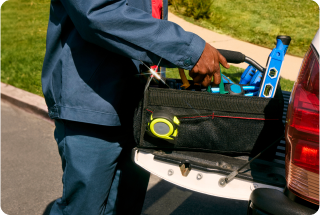3. What kind of limits are on your coverage?
It’s important for you and your clients to understand what is and isn’t covered in a home warranty plan. American Home Shield makes that easy with its Livable and Forgivable coverage.
Every real estate plan offered by American Home Shield is built for everyday, real life. There are no age limits, no inspections, and no maintenance records required. In addition, American Home Shield real estate edition plans cover breakdowns due to:
- Lack of maintenance
- Rust, corrosion, and sediment
- Mismatched systems
- Undetectable, pre-existing conditions
- Improper installations, repairs, or modifications
- Removal of defective equipment
- Refrigerant capture, reclaim, and disposal
- Permits and code violations ($250 per agreement term when required during a covered repair or replacement)
(See state-specific product and pricing flyer for more information)
4. Does your company stand behind its promises?
If your clients are considering a home warranty company, it’s important to verify whether that company actually does what it says it will. American Home Shield has paid $2 billion in warranty claims in the last five years. In fact, American Home Shield is glad for clients to use their warranties for covered items, because it gives the company a chance to exhibit service excellence and build long-term relationships, too.
5. Does your company offer any additional benefits or services for customers?
You want to make sure that your clients get the maximum value out of their home warranty purchase by taking advantage of any extra services or savings. For example, some of the extra benefits offered by American Home Shield to its customers include:
- Rekey* service for your clients to have their locks rekeyed
- An exclusive discount on several tech installation and setup services by HelloTech*
- Additional property discounts* for your clients when they buy warranty coverage for multiple properties
- Seasonal HVAC tune-ups* for just $75 per unit
Most importantly, a home warranty company should welcome your questions and be eager to answer them to make sure that you and your clients feel comfortable and informed. If you have additional questions about American Home Shield home warranties, be sure to contact a member of your American Home Shield team or visit ahs.com/real-estate for more information.
*Limitations and exclusions apply. See the agreement for details. Offer not included in the Seller Coverage Option. For buyer use only.




